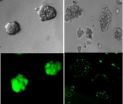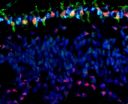(Press-News.org) Ottawa, Canada – September 24, 2014 – Ovarian cancer is the most deadly gynecological cancer, claiming the lives of more than 50% of women who are diagnosed with the disease. A study involving Ottawa and Taiwan researchers, published today in the influential Proceedings of the National Academy of Sciences (PNAS), provides new insight into why ovarian cancer is often resistant to chemotherapy, as well as a potential way to improve its diagnosis and treatment.
It is estimated that 2,700 Canadian women will be diagnosed with ovarian cancer in 2014 and that 1,750 Canadian women will die from the disease, according to Ovarian Cancer Canada. This cancer is often diagnosed late and develops a resistance to chemotherapy.
"What we've discovered will help clinicians to better treat women with ovarian cancer," says Dr. Ben Tsang, senior scientist at the Ottawa Hospital Research Institute and professor at the University of Ottawa. "The key is understanding the role of a protein called gelsolin. With our colleagues from National Cheng Kung University in Taiwan, we found that an increased level of this protein is associated with aggressive forms of ovarian cancer that are more likely to be resistant to chemotherapy and lead to death."
The researchers showed how gelsolin works at the molecular level to protect cancer cells against a widely used chemotherapy drug called cisplatin.
The findings are important because they will help clinicians to determine the most effective treatment plan based on the level of gelsolin. Work still needs to be done to determine exactly how much gelsolin indicates a cancer that is chemo-resistant and would require different treatment options.
In addition, this same protein that makes ovarian cancer cells resistant to chemotherapy can be used to overcome this treatment obstacle. By cutting gelsolin down to a specific fragment and putting it into chemo-resistant cancer cells, the international team discovered they could make these cells susceptible to the cancer-killing effects of cisplatin.
"We believe this discovery is a promising avenue for developing a new therapy to reduce chemo-resistance in women with this deadly disease," said Dr. Dar-Bin Shieh, collaborative partner from National Cheng Kung University of Taiwan. Shieh is currently leading the International Institute of Macromolecular Analysis and Nanomedicine Innovation (IMANI), which is focused on translating molecular discoveries to the clinic.
Based on 2009 estimates, approximately one in 72 Canadian women will develop ovarian cancer in her lifetime and one in 93 will die from it.
INFORMATION:
The full article "Cell Fate Regulation by Gelsolin in Human Gynecologic Cancers" was published this week in the Proceedings of the National Academy of Sciences.
This study was supported by the Canadian Institutes of Health Research and the National Science Council of Taiwan.
Ottawa Hospital Research Institute
The Ottawa Hospital Research Institute is the research arm of The Ottawa Hospital and is an affiliated institute of the University of Ottawa, closely associated with its faculties of Medicine and Health Sciences. The Ottawa Hospital Research Institute includes more than 1,700 scientists, clinical investigators, graduate students, postdoctoral fellows and staff conducting research to improve the understanding, prevention, diagnosis and treatment of human disease. Research at Ottawa Hospital Research Institute is supported by The Ottawa Hospital Foundation.
University of Ottawa: A crossroads of cultures and ideas
The University of Ottawa is home to almost 50,000 students, faculty and staff, who live, work and study in both French and English. Our campus is a crossroads of cultures and disciplines, where bold minds come together to inspire game-changing ideas. We are one of Canada's top 10 research universities — our professors and researchers explore new approaches to today's challenges. One of a handful of Canadian universities ranked among the top 200 in the world, we attract exceptional thinkers and welcome diverse perspectives from across the globe.
National Cheng Kung University
National Cheng Kung University (NCKU) is a research-led comprehensive university in Tainan City, Taiwan. Since its establishment in 1931, NCKU has nurtured countless social elites and leaders under the trailblazing efforts of its former faculties and staffs. NCKU is one of the most prestigious universities in Taiwan, with a high reputation in science, engineering, medicine, management, planning and design. The university is a role model for the transformation of Taiwan's higher-educational institutes, and is also an important pillar of the country's economic and industrial structure.
For further information, please contact
Paddy Moore
Communications and Public Relations
Ottawa Hospital Research Institute
padmoore@ohri.ca
(o) 613-737-8899 x73687 or (c) 613-323-5680
Kina Leclair
Media Relations Officer
University of Ottawa
kleclair@uOttawa.ca
(o) 613-562-5800 x2529 or (c) 613-762-2908
Sonia Chuang
National Cheng Kung University
1 University Road, Tainan City 701, Taiwan
sonia20@mail.ncku.edu.tw
(o) +886-6-275-7575 Ext. 50042
A way to kill chemo-resistant ovarian cancer cells: Cut down its protector
2014-09-24
ELSE PRESS RELEASES FROM THIS DATE:
Star Trekish, rafting scientists make bold discovery on Fraser River
2014-09-24
A Simon Fraser University-led team behind a new discovery has "…had the vision to go, like Star Trek, where no one has gone before: to a steep and violent bedrock canyon, with surprising results."
That comment comes from a reviewer about a truly groundbreaking study just published in the journal Nature.
Scientists studying river flow in bedrock canyons for the first time have discovered that previous conceptions of flow and incision in bedrock-rivers are wrong.
SFU geography professor Jeremy Venditti led the team of SFU, University of Ottawa and University of British ...
Bacterial 'communication system' could be used to stop and kill cancer cells, MU study finds
2014-09-24
COLUMBIA, Mo. – Cancer, while always dangerous, truly becomes life-threatening when cancer cells begin to spread to different areas throughout the body. Now, researchers at the University of Missouri have discovered that a molecule used as a communication system by bacteria can be manipulated to prevent cancer cells from spreading. Senthil Kumar, an assistant research professor and assistant director of the Comparative Oncology and Epigenetics Laboratory at the MU College of Veterinary Medicine, says this communication system can be used to "tell" cancer cells how to act, ...
Study: Biochar alters water flow to improve sand and clay
2014-09-24
As more gardeners and farmers add ground charcoal, or biochar, to soil to both boost crop yields and counter global climate change, a new study by researchers at Rice University and Colorado College could help settle the debate about one of biochar's biggest benefits -- the seemingly contradictory ability to make clay soils drain faster and sandy soils drain slower.
The study, available online this week in the journal PLOS ONE, offers the first detailed explanation for the hydrological mystery.
"Understanding the controls on water movement through biochar-amended soils ...
NASA sees the end of post-depression Fung-Wong
2014-09-24
Tropical Depression Fung-Wong looked more like a cold front on infrared satellite imagery from NASA than it did a low pressure area with a circulation.
NASA's Aqua satellite passed over Tropical Depression Fung-Wong on Sept. 23 at 12:23 a.m. EDT. The Atmospheric Infrared Sounder or AIRS instrument that flies aboard Aqua gathered infrared temperature data on the storm's clouds. The data was false-colored at NASA's Jet Propulsion Laboratory, Pasadena, California and showed that the storm resembled a frontal system more than a depression. The center of circulation was southwest ...
How a single, genetic change causes retinal tumors in young children
2014-09-24
Retinoblastoma is a childhood retinal tumor usually affecting children one to two years of age. Although rare, it is the most common malignant tumor of the eye in children. Left untreated, retinoblastoma can be fatal or result in blindness. It has also played a special role in understanding cancer, because retinoblastomas have been found to develop in response to the mutation of a single gene – the RB1 gene—demonstrating that some cells are only a step away from developing into a life-threatening malignancy.
David E. Cobrinik, MD, PhD, of The Vision Center at Children's ...
New milestone in the search for water on distant planets
2014-09-24
Astronomers have found water vapor in the atmosphere of a planet about four times bigger than Earth, in the constellation Cygnus about 124 light years - or nearly 729 trillion miles - from our home planet. In the quest to learn about planets beyond our solar system, this discovery marks the smallest planet for which scientists have been able to identify some chemical components of its atmosphere.
The researchers' findings were published Sept. 25, 2014 in the journal Nature. The team was led by University of Maryland Astronomy Professor Drake Deming, an expert in the study ...
A single statistic can strengthen public support for traffic safety laws
2014-09-24
Public support for effective road safety laws, already solid, can be strengthened by a single number: a statistic that quantifies the traffic-related injury risks associated with a given law, according to a new study from the Johns Hopkins Center for Injury Research and Policy at the Johns Hopkins Bloomberg School of Public Health.
The study, published in the September issue of Accident Analysis & Prevention, surveyed 2,397 adults nationwide about their attitudes toward four types of road-safety laws —mandatory ignition interlock installation for people convicted of driving ...
Alzheimer's patients can still feel the emotion long after the memories have vanished
2014-09-24
A new University of Iowa study further supports an inescapable message: caregivers have a profound influence—good or bad—on the emotional state of individuals with Alzheimer's disease. Patients may not remember a recent visit by a loved one or having been neglected by staff at a nursing home, but those actions can have a lasting impact on how they feel.
The findings of this study are published in the September 2014 issue of the journal Cognitive and Behavioral Neurology, and can be viewed online for free here.
UI researchers showed individuals with Alzheimer's disease ...
Clear skies on exo-Neptune
2014-09-24
Astronomers using data from the NASA/ESA Hubble Space Telescope, the Spitzer Space Telescope, and the Kepler Space Telescope have discovered clear skies and steamy water vapour on a planet outside our Solar System. The planet, known as HAT-P-11b, is about the size of Neptune, making it the smallest exoplanet ever on which water vapour has been detected. The results will appear in the online version of the journal Nature on 24 September 2014.
The discovery is a milestone on the road to eventually finding molecules in the atmospheres of smaller, rocky planets more akin ...
Most metal-poor star hints at universe's first supernovae
2014-09-24
A team of researchers, led by Miho N. Ishigaki, at the Kavli IPMU, The University of Tokyo, pointed out that the elemental abundance of the most iron-poor star can be explained by elements ejected from supernova explosions of the universe's first stars. Their theoretical study revealed that massive stars, which are several tens of times more immense than the Sun, were present among the first stars. The presence of these massive stars has great implications on the theory of star formation in the absence of heavy elements.
Iron-poor stars provide insight about the very ...




